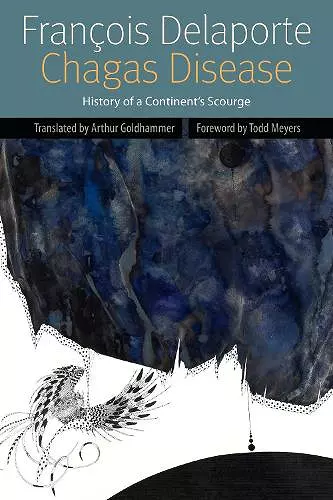Chagas Disease
History of a Continent's Scourge
François Delaporte author Arthur Goldhammer translator
Format:Hardback
Publisher:Fordham University Press
Published:14th Aug '12
Currently unavailable, and unfortunately no date known when it will be back

In Chagas Disease: History of a Continent’s Scourge, François Delaporte describes how the interaction of public health policy with medical knowledge and epistemological transformations in the period 1900-1935 can account for the discovery of a continental endemic. It also deconstructs the myths that surround a number of major medical discoveries in both Brazil and Argentina.François Delaporte’s Chagas Disease chronicles Brazilian medicine’s encounter with a disease, an insect, and a history of discovery. Between 1909 and 1911, Carlos Chagas described an infection (pathogenic trypanosome), its intermediate host, and the illness that he believed it caused, parasitic thyroiditis. Chagas’s work did not lack significance: the disease that came to share his name would be one of Latin America’s most serious endemic diseases. However, the clinical identification of the disease through “Romaña’s sign” (a palpebral edema or swelling of the eyelid) some decades later marked a transformation in the general medical knowledge of the disease and its basis altogether. Not only was the disease entity that Chagas had described shown to be a nosological illusion, but twenty-five years of scientific controversy turned out to have been based on a misunderstanding. The continued use of the term “Chagas’s Disease” even after Cecilio Romaña’s discovery thus refers to a fundamental ambiguity. Delaporte dispels this ambiguity by re-examining the various discoveries, dead ends, controversies, and major epistemological transformations that marked the history of the disease––a history that begins with the creation of the Oswaldo Cruz Institute in Rio de Janeiro and ends in the forests of Santa Fe in northern Argentina. Delaporte’s study shows how an epistemological focus can add depth to the history of medicine and complexity to accounts of scientific discovery.
Delaporte’s brilliant historical exploration of Chagas' disease covers the decisive period of 1909-1935. The strength of the study is the exhaustive discussion of the scientific literature, the subtle examination of fundamental shifts in conceptual frameworks, and the unrelenting interrogation of the crucial role that chance and error play in scientific research. What Delaporte has written is a comédie humaine of post-colonial science.---—Carlo Caduff, King's College, London
Several points about the discovery of Chagas disease as described in the book are striking. * —The Lancet *
In this finely crafted monograph, Francois Delaporte tackles one of the most complex diseases, American trypanosomiasis, known as Chagas Disease. Through his skillful dissection, he shows how complicated its discovery actually was, and offers wonderful insights into the international dimensions of Brazilian medical science in the early twentieth century. It is good to have this important work available in English.---—W. F. Bynum, MD, PhD, FRCP, Professor Emeritus, University College London
If Delaporte is correct then Chagas did not discover the causative organisms of American trypanosomiasis, did not work out the life cycle in the bug and did not discover the disease. So why is he so revered? Delaporte thinks that this is because Chagas was an expert at reformulating the past by rewriting history. * —Parasitology *
'Chagas Disease' is a page-turner, where the reader is invited to wonder what will happen next. * —International Studies in the Philosophy of Science *
ISBN: 9780823242498
Dimensions: unknown
Weight: unknown
208 pages